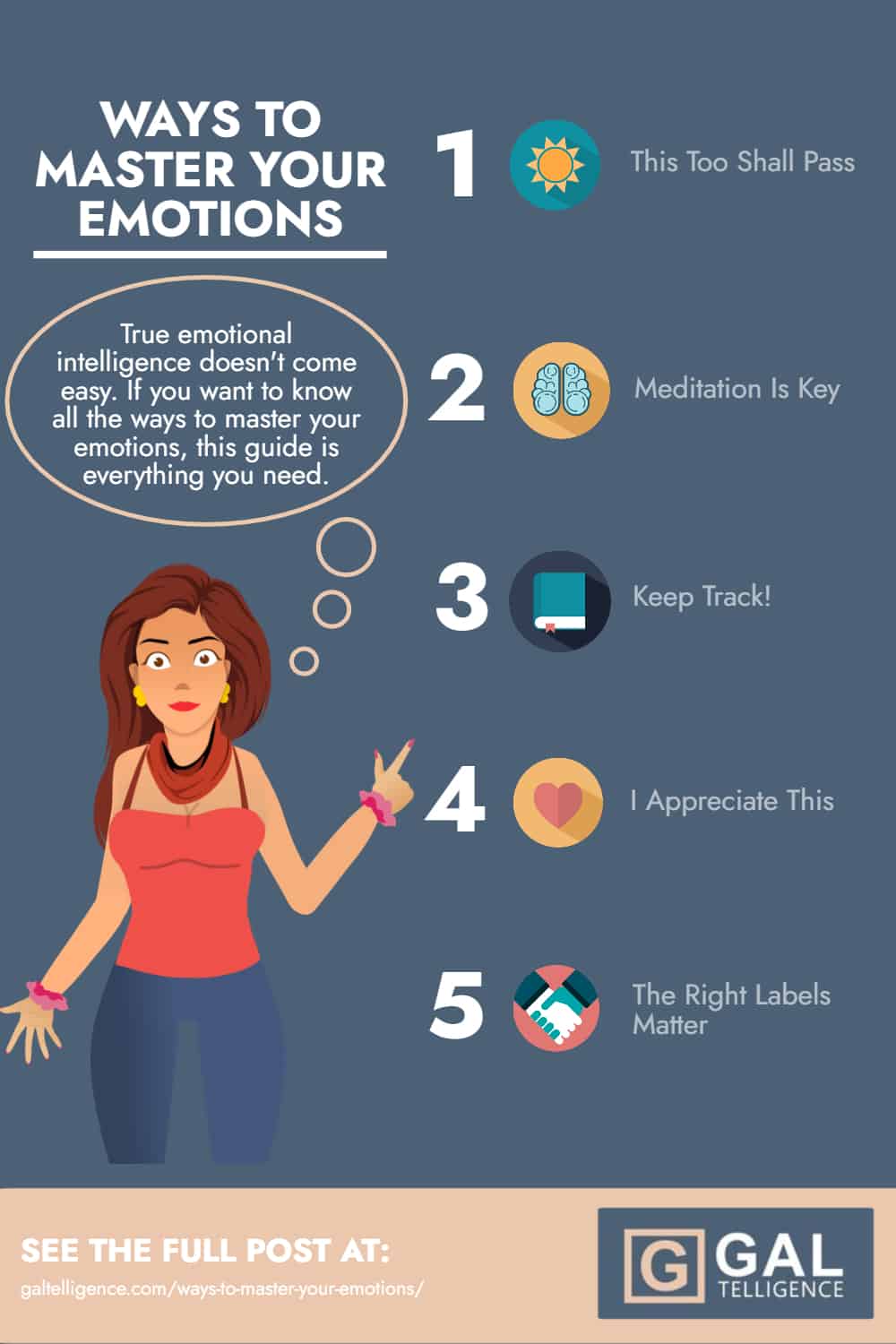
via: Unsplash / Radu Florin
In this post, I'm teaching you all the ways to master your emotions.
True emotional intelligence doesn't come easy. It takes time, continuous effort, and sometimes, cutting off unhealthy interpersonal relationships. Having been a victim of an unhappy relationship, I've made it my life's work to help others master emotional intelligence through my writings, as seen in my published works in UpJourney and Shondaland.
Start your journey to a better life and mind with these ways to master your emotions. Let's go!
Contents
5 Ways to Master Your Emotions

via: Unsplash / Blake Carpenter
Emotional mastery is a continuous process of emotional awareness. It's the constant practice of learning how to recognize your emotional triggers, including unpleasant feelings like anger, fear, anxiety, sadness, and even self-doubt.
Emotional mastery also means becoming better at controlling your emotional responses. It's replacing toxic coping mechanisms with positive ones instead of getting carried away in a rollercoaster of emotional turmoil.
5. The Right Labels Matter

via: Unsplash / Amy Humphries
In dating, knowing whether or not a man is right for you requires learning his different traits and weighing the pros and cons. Understanding a man's personality and labeling each of his traits bad or good saves you from a lot of trouble along the way. This should also be the case when mastering emotions.
Emotional psychology identifies four core emotions- happiness, sadness, fear, and anger. But there are a lot of other different emotions such as surprise, shame, guilt, and disgust. Identifying and labeling your emotions, especially negative ones, is the first step to emotional awareness.
Whatever way you're feeling, recognizing and labeling difficult emotions allows you to handle and face them head-on and, in turn, gives you an upper hand against emotional triggers, which might include traumatic memories, uncomfortable topics, and other people's words or actions.
The key to identifying your triggers is to practice listening to your mind and body. Situations that stir up intense emotions or physical sensations like a pounding heart, nausea, dizziness, and sweaty palms are usual indicators of distress. The moment you realize these signs, take a step back, breathe, and understand the reason/s behind it.
Sometimes we can get so caught up in our emotions that we don't stop and think about what we're feeling and why we're feeling them. By labeling your feelings, you're helping your brain process them properly and respond in much better ways.
2. I Appreciate This

via: Unsplash / Ronny Sison
Now that you have identified and labeled your emotions, learning how to acknowledge and appreciate them is next on your list. People often suppress unpleasant feelings to avoid dealing with them or look vulnerable, but this kind of unhealthy emotional management do you more harm than good.
Denying negative emotions like feelings of frustration and resentment causes not only physical stress but also mental decline. Physically, repressed emotions weaken your immune system. Mentally, stamped-out feelings lead to anxiety and depression.
Bottling up your emotions for far too long also causes emotional outbursts and might cause you to blow up on unsuspecting people.
More than that, masking your emotions instead of acknowledging them prevents clear communication with the people in your life and thus strains your relationships. Hiding your feelings, especially with people who care about you, affects their confidence in you. Why? Because open communication is important in any successful relationship, and not being able to maintain one may cause them to question the strength of your relationship.
Acknowledging your emotions helps you better navigate through your negative feelings by diminishing their power over you. When dealing with emotions, always remember that your feelings don't control you. You control them.
Learning how to communicate your emotions, especially with the people you trust, provides you reinforcement (think of them as your backup team) on days when it's extra hard to deal with them. Your support circle can also give you a different perspective and insight about a certain issue and help you make healthier steps and better decisions. After all, two heads are better than one.
Whether good or bad, feeling certain emotions is how you know you're alive, and learning how to acknowledge and appreciate your emotions puts you one step closer to emotional intelligence.
3. Keep Track!

via: Unsplash / Darius Bashar
Aside from acknowledging your emotions, keeping track of them is also important. Tracking your emotions is the best way for you to prevent spinning down into the rabbit hole of emotional turmoil.
Your emotions translate into your feelings, and your feelings affect your behavior. Recognizing and tracking how you're feeling in certain situations enables you to make better steps or actions to take care of yourself at the moment. It's like taking the driver's seat away from your negative feelings instead of allowing them to steer your emotional reaction.
Tracking your feelings also helps you experience more positive emotions. Concepts, like our emotions, become more reinforced and ingrained into our brain's model of the world if we direct our attention to them. This helps you somehow predict and cultivate future positive feelings in your life.
You can keep track of your emotions by writing them down. Tracking your mood helps you identify the internal and external stimulus that causes your mood swings and helps you plan out better coping techniques that help you deal with negative thoughts and emotions more effectively.
2. Meditation Is Key

via: Unsplash / Benjamin Child
Meditation keeps your emotional state in its prime. No, you don't have to turn off your feelings and become emotionless. Meditation is about training yourself to be mindful and aware of your present and the world around you. According to Tara Bach, a Washington-based meditation teacher, "The purpose of mindfulness meditation is to become mindful throughout all parts of our life so that we're awake, present, and open-hearted in everything we do."
The good thing about it is you can practice it anytime, anywhere. If you're a beginner, listening to basic, guided meditations will help you get started. I personally love using meditations apps like Headspace and Calm. I find following a man or a woman's voice helps me recenter every time I'd get lost in thought.
During your first few weeks of practice, you might find it hard to stay in the present and not get caught up with your thoughts. If that happens, take a moment and pause, let go of whatever it was you were thinking about, recenter, and redirect your awareness back to your breath as you mindfully inhale and exhale.
Meditation also helps you manage your negative thoughts. Instead of ignoring or turning them off, you simply become aware of them and then let them go. This enables you to steer clear of negativity and experience more positive experiences.
Practicing meditation not only promotes emotional health and self-awareness but also reduces your stress, controls your anxiety, and increases your attention span.
Every morning or any time of the day, really, give yourself at least twenty minutes of quiet time and tune in with yourself and your emotions. If you're too busy and can't commit to a twenty-minute sesh, doing three or ten-minute mindful breathing exercises is better than nothing.
So put your mind at ease and breathe.
1. This Too Shall Pass

via: Unsplash / Roberto Nickson
As with the phases of the moon, how you feel at a certain moment in time isn't permanent and is bound to change.
Emotions come and go, and when I get upset, I try to put myself five years into the future by asking, "Will this even matter to me after five years?" and almost always, my answer will always be no. Asking this question right when I'm about to get upset helps me get back to the ground and respond more calmly to a situation that could otherwise make me act badly or say things that I will eventually regret after.
Whenever you start feeling mad or upset about someone or something, it's always best to take a pause, recognize and accept your feelings, remember that they will pass at some point, and then let them go. There's no use dwelling on a negative emotion when you know that it won't last forever.
Always remember that, like anything else in the world, your emotion, too, will pass. Nothing is permanent. Knowing and keeping this in mind will help you manage your emotions better, improve your well-being, and help build better relationships.

via: Galtelligence
Share This Image On Your Site
The One Way You're Handling Your Emotions That Is More Harmful than Helpful

via: Unsplash / Joanna Nix-Walkup
Have a friend offended you, but instead of telling them how you feel, you start acting passive-aggressive? Have you held a grudge too long and ended up having a big meltdown? Do you always try to distract yourself from feeling down?
We've all been guilty of denying our feelings one way or another, but this unhealthy emotional management actually causes you more harm than good.
You might be thinking, "Why would a person try to hide his or her feelings?" A person who is in denial is a person who is struggling to accept a strong emotion that is overwhelming or distressing, like fear or self-doubt, for example.
Hiding your feelings in the belief that doing so would make them eventually disappear is wrong. The only thing it's doing is letting your bad thoughts pile up and pushing you closer to a mental breakdown.
A person struggling to be honest with their emotions may also resort to committing toxic coping mechanisms like alcohol abuse, binge-eating, overworking, and self-harm. And as someone who's had a fair share of battling with emotions, learning how to express yourself instead of trying to hold them back all the time is much more worth it than losing yourself to emotional pain.
Denial just bottles everything up and turns you into a ticking time bomb. Instead, acknowledge and accept what you're feeling and remember that it is valid and is worthy of being felt with the same empathy you would give others.
In Conclusion
Do you know more ways to master your emotions? Your emotional intelligence matters as much as your physical strengths.
Remember the keys to emotional mastery? If you want to gain true emotional intelligence, recognize and label your emotions, acknowledge and accept them, keep track of your moods, meditate, and remember that feelings don't last—especially the bad ones.
A person with high emotional intelligence is always better at making healthy choices both in life and love. A woman who is a master of her emotions knows better than letting self-doubt get the best of her.
Start your journey to emotional mastery and let these helpful ways to master your emotions guide you to higher ground.













